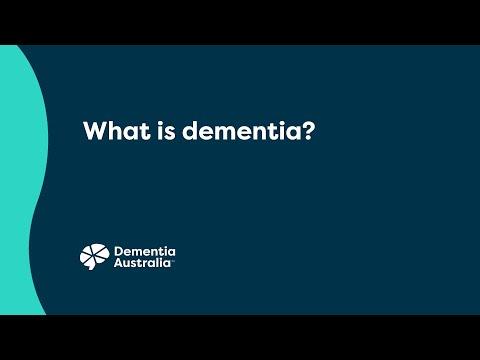About dementia
Dementia is a brain condition. It’s not a normal part of ageing. Learn more about what dementia is, its symptoms, diagnosis, treatment and support.

Key points
Dementia is a brain condition. It’s not a normal part of ageing.
The effects of dementia vary, but generally, dementia affects your mood, memory, thinking and behaviour.
Dementia can happen to anybody, but it is much more common after the age of 65.
There’s currently no known cure for dementia, but there are treatments for many of the symptoms, and support is available.
Dementia describes a collection of symptoms caused by disorders affecting the brain.
Dementia is not a normal part of getting older, and it isn’t one specific disease. Instead, it’s a broad term that covers the effects on people of a number of different medical conditions.
Those conditions include Alzheimer’s disease, vascular dementia, the Lewy body dementias and more.
The effects of dementia vary from person to person, but generally, dementia affects your mood, memory, thinking and behaviour.
Dementia can happen to anybody, but it is much more common after the age of 65.
In Australia, there are an estimated 446,500 people living with dementia. Dementia is now the leading cause of death for Australians, according to the Australian Institute of Health and Welfare (AIHW).
There are things you can do to reduce your risk of developing dementia.
There’s currently no known cure for dementia, but there are treatments for many of the symptoms. Some people with dementia lead active and fulfilling lives for many years after their diagnosis.
Researchers around the world are working on new treatments for dementia.
Causes of dementia
Dementia can happen to anybody, but it is much more common after the age of 65.
Many different conditions can cause dementia. For many people diagnosed with dementia, the exact cause is never known.
Dementia can be hereditary, but this is quite rare. Your risk depends on the cause of the dementia. About a third of people with Alzheimer’s disease have a close relative (parent or sibling) diagnosed with dementia. However, in many cases, it occurs when there is no family history of the condition.
Signs and symptoms of dementia
Because dementia can be caused by so many different conditions, everyone’s experience of dementia is unique.
But broadly, dementia can affect your:
Memory
You might find it harder to remember recent events, names of things and people. It might also get harder to make new memories.
Thinking
You might get more confused, have trouble concentrating, planning and problem-solving, struggle to complete everyday tasks, find it hard to think of the right word or express yourself, and find it hard to judge distances, directions and time.
Mood
You might find yourself feeling less motivated and social, more prone to depression, anxiety and agitation, or otherwise not yourself.
Behaviour
You might start saying or doing things that are out of character for you. You might become restless and wander, and have more disturbed sleep.
- Early warning signs
Learn the most common early signs and symptoms of dementia, how to notice them, and what you can do if they happen to you.
- Mood and behaviour changes
Dementia can change the way someone feels and behaves. Learn about the causes of mood and behaviour changes and what you can do to help.
Conditions that lead to dementia
Find out more about the most common dementia-related conditions on our 'Types of dementia' page.
Diagnosing dementia
There isn’t one single test that tells you if you have or don’t have dementia.
Instead, doctors will do several different kinds of test. The results of these tests will help them rule out some conditions, and get closer to working out what’s causing your changes.
If it’s not anything serious, you can put your mind at rest.
If it’s some other condition than dementia, you can start getting treatment.
If you get a diagnosis of dementia, the sooner you know, the more you can do.
- The sooner you know, the more you can do
If you or a loved one have concerns about changes to memory, mood or thinking, there is support and information to help you.
- Testing and diagnosis
How to make the decision to talk to your doctor about changes in your memory, thinking, behaviour and mood, and what tests they might do.
The progression of dementia
Everyone experiences dementia differently, so the way your symptoms change will be unique to you. You might have better days and harder days.
But dementia is a progressive condition. That means that your symptoms will become stronger over time. That might happen quickly or over several years.
You can think of dementia as having three stages.
Early stage dementia
In mild or early-stage dementia, you might experience some changes in your thinking and memory.
You might sometimes repeat yourself, mix up words, or misplace things more than you used to.
You might struggle more in social situations, or feel less motivated.
But most people with early-stage dementia are able to support themselves. In fact, many people at this stage don’t have a diagnosis of dementia, because their changes haven’t felt worrying enough for them to get tested.
Middle-stage dementia
In moderate or middle-stage dementia, the changes to your mood, memory, thinking and behaviour are stronger. They have a bigger effect on your ability to do everyday things and take care of yourself.
You might have more trouble concentrating, understanding, reasoning and communicating.
You might forget how to dress or bathe, or to recognise family and friends.
You might experience confusion, distress, mood changes and aggression.
These stronger changes mean you will likely need support from other people, at home and in the community.
Late-stage dementia
In severe or late-stage dementia, your symptoms will be very strong. You may be unable to communicate, walk, control your bodily functions or look after your hygiene. You may be unable to remember people or places, and be unable to form new memories.
At this stage, you will need constant supervision and care. You may need to live in an aged care facility, where you can get the professional care you will need.

Treatment and management of dementia
Right now, there’s no known cure for dementia.
However, there are treatments and support services help to ensure your best possible quality of life as you live with the condition.
There are also things that you and the people around you can do to make sure you can live the best life you can.
- Treatment and management of dementia
Although there is no cure for dementia, there are treatments which help you live the best life you can. Learn about common treatments for dementia.
- Living with dementia
A dementia diagnosis changes things, but support is available. Learn about changes you can expect, how to plan ahead, and how to stay safe and connected.
How Dementia Australia can help
Whatever your experience of dementia, we're here for you.
Dementia Expert Webinars
For a deeper dive into dementia-related topics, try our free Dementia Expert Webinars.
